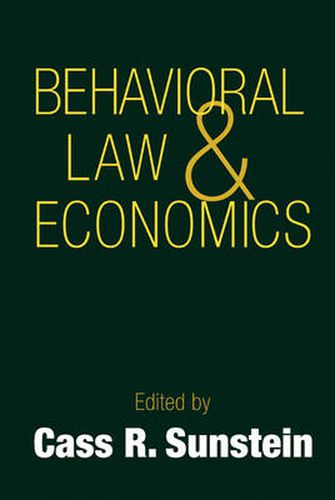Readings Newsletter
Become a Readings Member to make your shopping experience even easier.
Sign in or sign up for free!
You’re not far away from qualifying for FREE standard shipping within Australia
You’ve qualified for FREE standard shipping within Australia
The cart is loading…






This exciting volume marks the birth of a new field–a field that studies law with reference to an accurate, rather than a crude, understanding of human behavior. Behavioral Law and Economics presents new findings in cognitive psychology and behavioral economics, which show that people are frequently both unselfish and over-optimistic; that people have limited willpower and limited self-control; and that people are boundedly rational, in the sense that they have limited information-processing powers, and frequently rely on mental short-cuts and rules of thumb. Understanding this kind of human behavior has large-scale implications for the analysis of law, in areas including environmental protection, taxation and tax compliance, constitutional law, voting behavior, punitive damages for civil rights violations, labor negotiations and strikes, and corporate finance. Behavioral Law and Economics offers many new insights into these fields and suggestions for legal reform. With a better knowledge of human behavior, it is possible to predict the actual effects of law, to see how law might actually promote society’s goals, and to reassess the questions of what law should be doing.
$9.00 standard shipping within Australia
FREE standard shipping within Australia for orders over $100.00
Express & International shipping calculated at checkout
This exciting volume marks the birth of a new field–a field that studies law with reference to an accurate, rather than a crude, understanding of human behavior. Behavioral Law and Economics presents new findings in cognitive psychology and behavioral economics, which show that people are frequently both unselfish and over-optimistic; that people have limited willpower and limited self-control; and that people are boundedly rational, in the sense that they have limited information-processing powers, and frequently rely on mental short-cuts and rules of thumb. Understanding this kind of human behavior has large-scale implications for the analysis of law, in areas including environmental protection, taxation and tax compliance, constitutional law, voting behavior, punitive damages for civil rights violations, labor negotiations and strikes, and corporate finance. Behavioral Law and Economics offers many new insights into these fields and suggestions for legal reform. With a better knowledge of human behavior, it is possible to predict the actual effects of law, to see how law might actually promote society’s goals, and to reassess the questions of what law should be doing.